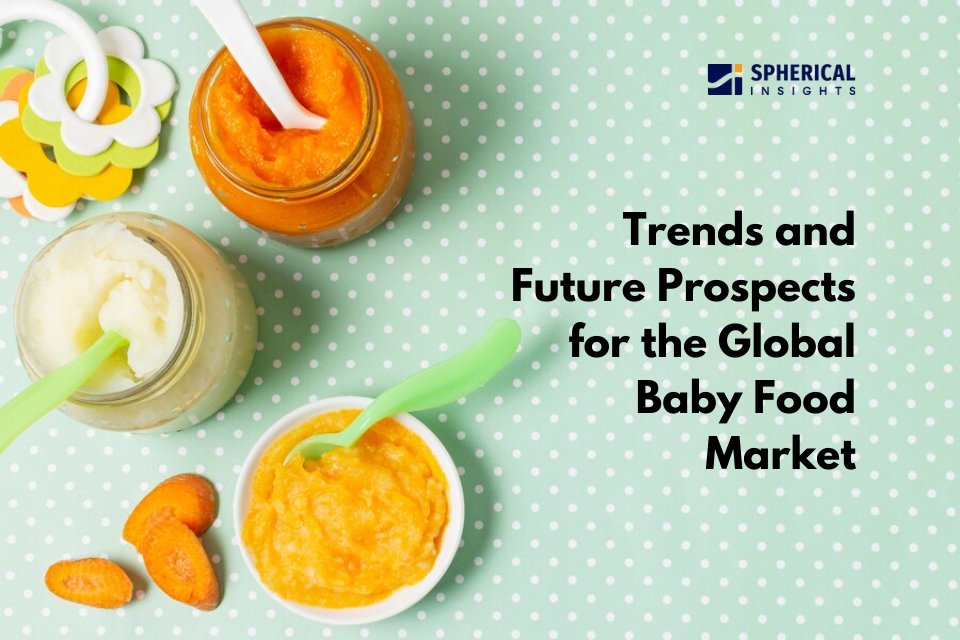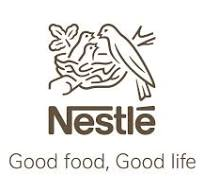Trends and Future Prospects for the Global Baby Food Market
RELEASE DATE: Jul 2024 Author: Spherical Insights Request Free Sample
Overview
Any soft or easily ingested food that is not breast milk is referred to as baby food. Breast milk is primarily meant for newborns to consume in order to supply them the energy and nutrients they require for optimal development. The global baby food market size is expected to grow from USD 71.04 billion in 2023 to USD 125.13 billion by 2033, at a CAGR of 5.82% during the forecast period 2023-2033. Growing numbers of women are entering the workforce, which is increasing reliance on easily accessible commercial infant feeding products.
Advancements in Baby Food
Bobbie, Danone S.A., Hero Group, Nestle S.A., and Abbott are some of the significant participants in the infant food business. The companies are heavily focusing on extending their consumer base by partnering with other significant business stakeholders or forming joint ventures, which helps to increase profit income. For instance, Bobbie, a trailblazing infant formula company, saw major growth in their product line in March 2023 when the FDA approved their innovative Tolerance Formula. Being the first of its kind, the Tolerance Formula stands out for utilizing premium ingredients specifically designed to meet the needs of babies.
Government Initiatives and Regional Market Expansion
A nonprofit organization called "India Spend" reports that the proportion of rural women in the labor force climbed from 32.2% in 2019–20 to 35.8% in 2020–21. According to UNICEF (United Nations International Children's Security Fund) estimates, a concerning degree of malnutrition in children under five years old accounts for half of their fatalities. Thus, during the projection period, it is anticipated that hunger and malnutrition will present the infant food business with profitable growth prospects. Asia-Pacific region will continue to hold a dominant position in the global baby food market due to government initiatives to improve child health and nutrition, as well as the growth of distribution channels and significant investments made by industry players in cutting-edge products and marketing techniques.
Insights and Projections: Global Baby Food Market Analysis
The report provides a summary of the global top trends and future prospects for the global Baby Food market based on historical data sets (current trends, industry statistics, and emerging trends shaping the Baby Food industry’s future, preliminary estimates from 2020-2021, 2022, and 2023), as well as projections for the global Baby Food trends and future prospects for global regions in 2024 and 2025. This data-driven research offers users an industry-wide view of emerging technologies and innovative insights to help them make critical business decisions.
Growth Factors and Emerging Trends in the Baby Food Industry
- Urbanization and complicated lifestyle
Parents' choices have been greatly impacted by urbanization and the prevalence of fast-paced lifestyles, which has resulted in a noticeable rise in demand for portable and quick infant food options. The market for infant food is seeing a shift in customer behavior, which is shown in the rising popularity of pouches and single-serving containers. There is a growing market for specialized and nutritionally balanced baby food items as parents become more aware of the significance of nutrition in a child's early growth.
- The growing popularity of customized and personalized products
Parents are becoming more selective about the nutrition their kids receive, looking for specialized solutions that meet their child's unique nutritional requirements, tastes, and developmental stages. This trend toward more individualized options extends beyond the typical baby food line to include options that are specifically tailored to each person's needs, such as organic, allergy-free, or culturally appropriate options. Companies can benefit from this trend by offering solutions for individualized infant food. This enables parents to choose the tastes, ingredients, and nutritional values that best fit their child's requirements by hand. This not only takes care of allergy and intolerance worries, but it also gives parents the power to actively mold their children's diet, which makes them feel in charge and satisfied.
Opportunities and Future Prospects in the Baby Food Industry
- Growing demand for organic goods, new product innovation, and e-commerce and online retailing
The market for baby food has an opportunity to grow in this category and serve parents who are health-conscious due to the growing customer preference for natural and organic food products. Constant innovation in baby food formulations, textures, and packaging can give businesses a chance to set themselves apart from the competition and cater to parents' changing tastes. The growing popularity of e-commerce and online purchasing allows baby food producers to reach a wider audience, particularly in areas where e-commerce is growing in popularity.
List of Key Companies in the Baby Food Industry
- Bristol-Myers Squibb Company
- Abbott
- Danone
- Australia Ausnutria Dairy Pty Ltd
- H&H Group
- Nestlé S.A
- Hero Group
- Danone S.A.
- ASAHI GROUP HOLDINGS, LTD.
- Mead Johnson & Company, LLC.
Top 3 Players in the Baby Food Industry
- Danone

Headquarters: Paris, France
Danone has dedicated itself to promoting health via food for as long as the company has existed. Using Pasteur Institute cultures, Isaac Carasso started manufacturing yogurt in 1919 to treat intestinal illnesses in children. They began selling yogurts in pharmacies in Barcelona in the 1920s and then moved into grocery stores. Nutricia, which merged with Danone in 2007, was already making groundbreaking discoveries that were changing lives all over the world in the late 1890s. Danone debuted a new logo and its first corporate signature, One Planet. One Health, in 2017. These phrases express our belief that there is a connection between the planet's health and human health. It is a call to action for all food-related stakeholders and consumers to get involved in the food revolution, which is a movement that promotes the adoption of more sustainable, healthier eating and drinking practices.
- Nestlé

Headquarters: Switzerland
Nestlé is the globe's biggest beverage and food company. Nestlé have over 2000 brands, from global landmarks to local favorites, and we operate in 191 countries throughout the world. With its headquarters located in Vevey, Switzerland, the company runs factories throughout over 80 nations. Condensed and powdered milk, infant meals, chocolate goods, candies, instant coffee and tea, soups, seasonings and sauces, frozen foods, ice cream, and bottled water are among Nestlé's main offerings. The company also manufactures medications.
- Hero Group

Headquarters: Lenzburg (Aargau), Switzerland
Hero Group is a privately held consumer food production and marketing firm situated in Switzerland. Hero Baby provides an extensive selection of food and milk products for infants and toddlers that are made with the freshest, most carefully chosen ingredients from our farms and meet the highest requirements for baby food quality. Inspired by home-cooked meals, they provide the authentic flavor of real fruits and vegetables straight from our kitchen to yours, all while avoiding the need for artificial preservatives. These items are abundantly full of natural flavor, color, and texture to enable your baby to feel all the benefits of nature. Their delicate and cautious production procedures ensure the least amount of processing necessary to maximize nutritious value.
- Mead Johnson & Company, LLC.

Headquarters: Chicago, Illinois
Mead Johnson & Company, LLC., a prominent infant formula manufacturer based in the United States, was established in 1905 and markets its products under the Enfamil brand. These products' primary goal is to provide nourishment to newborns in order to support their physical and mental development. Pediatricians frequently recommend Enfamil brands of baby formula. The corporation is modernizing its production facilities to improve the quality of its products. Mead Johnson & Company, LLC. announced in 2022 that it would update and release its main product, "NeuroPro," with an improved recipe.
- Abbott

Headquarters: Illinois, United States
Abbott is a well-known, international healthcare leader that offers a premium selection of infant food items. Abbott, which was founded in 1888, has a long history of offering formulas for various developmental stages and supplying babies and toddlers with vital nourishment. Abbott maintains its market leadership by launching new products and formulations while guaranteeing the highest levels of safety and efficacy, all while putting an emphasis on innovation and sustainability. Abbott's infant food products are highly regarded by parents and medical professionals globally due to their exceptional quality, nutritious content, and accessibility across borders.
Recent Development
- In January 2024, Danone India introduced AptaGrow, a cutting-edge toddler nutrition range designed to benefit the healthiest number of kids.
- In February 2024, Asahi Group Holdings, Ltd. has set an ambitious new goal of being net zero throughout its value chain by 2040. This accelerates the international company's net zero target by a decade, proving its dedication to sustainability and climate action. The 2040 net zero goal is based on the Science Based Targets Initiative's (SBTi*) net zero definition and includes scope 1, 2, and 3 emissions across the value chain.
- In January 2023, Sproutlife Foods Private Ltd. (SFPL), which produces nutrition bars under the cutting-edge brand Yoga Bar, has received a strategic investment from the salt-to-hotels conglomerate in order to strengthen its position in the Rs 45,000 crore healthy foods market in India. At that time, ITC had stated that it would buy 100% of SFPL over a span of three to four years, with 47.5% of the company to be purchased in installments by March 31, 2025, and the remaining portion to be acquired, contingent upon other terms specified in the legally binding contracts.
- In December 2022, Hindustan Unilever Limited (HUL) declared that it would be entering the "Health & Wellbeing" segment by means of strategic investments in Zywie Ventures Private Limited (OZiva) and Nutritionalab Private Limited (Wellbeing Nutrition). A rapidly growing category in India, "Health & Wellbeing" has a potential market size of about INR 30,0001 crores.
About the Spherical Insights & Consulting
Spherical Insights & Consulting is a market research and consulting firm which provides actionable market research study, quantitative forecasting and trends analysis provides forward-looking insight especially designed for decision makers and aids ROI.
Which is catering to different industry such as financial sectors, industrial sectors, government organizations, universities, non-profits and corporations. The company's mission is to work with businesses to achieve business objectives and maintain strategic improvements.
CONTACT US:
For More Information on Your Target Market, Please Contact Us Below:
Phone: +1 303 800 4326 (the U.S.)
Phone: +91 90289 24100 (APAC)
Email: inquiry@sphericalinsights.com, sales@sphericalinsights.com
Contact Us: https://www.sphericalinsights.com/contact-us